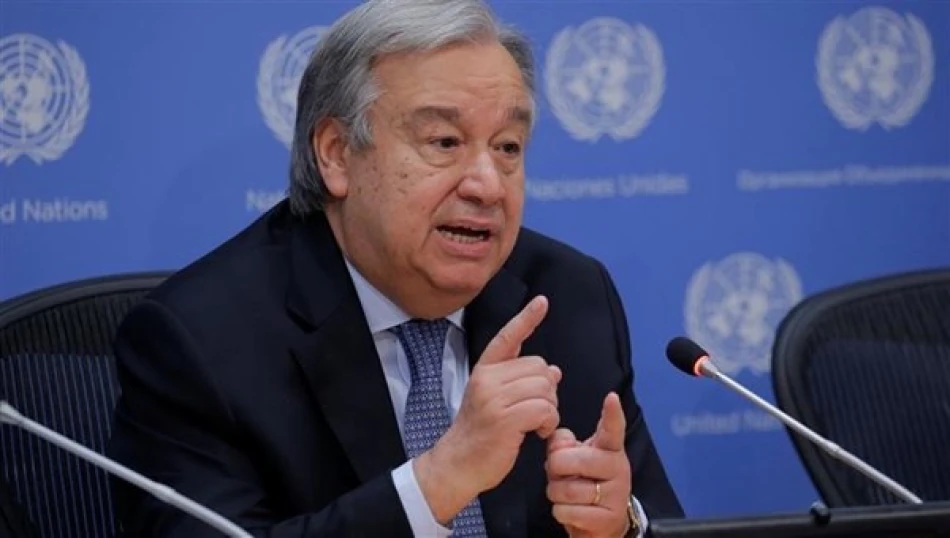
UN Chief Urges Ceasefire Between Cambodia and Thailand Amid Border Clashes
UN Chief Calls for Immediate Ceasefire as Cambodia-Thailand Border Clashes Escalate
UN Secretary-General António Guterres has urged Cambodia and Thailand to agree on an immediate ceasefire following armed clashes that erupted along their shared border on July 24, marking a dangerous escalation in long-standing territorial tensions between the Southeast Asian neighbors. The conflict has already resulted in civilian casualties and infrastructure damage on both sides, prompting an emergency UN Security Council session.
Diplomatic Intervention Amid Rising Casualties
Farhan Haq, Deputy Spokesman for the UN Secretary-General, announced that Guterres is "extremely concerned" about the ongoing armed confrontations and has condemned what he described as "tragic and unnecessary loss of life." The UN chief specifically called for both nations to immediately cease hostilities and address disputes through dialogue to find a permanent resolution.
The timing of this intervention reflects the severity of the situation, as both countries have accused each other of violating international law. The fact that Cambodia's Prime Minister Hun Manet personally requested the emergency Security Council meeting underscores the potential for further escalation.
Historical Context of Border Tensions
This latest flare-up represents another chapter in the complex border disputes that have periodically strained Cambodia-Thailand relations. The two nations share a 803-kilometer border that has been the source of territorial disagreements for decades, often centered around ancient temple sites and unclear demarcation lines established during the colonial period.
Previous border conflicts, particularly around the Preah Vihear temple complex in 2008-2011, resulted in dozens of deaths and displaced thousands of civilians. Those clashes also required international intervention and highlighted the fragility of peace agreements in the region.
Regional Stability at Stake
Economic Implications
The renewed conflict threatens to disrupt trade flows between two economies that have become increasingly integrated through ASEAN frameworks. Thailand is one of Cambodia's largest trading partners, and border closures or military tensions could significantly impact cross-border commerce, particularly affecting agricultural exports and manufacturing supply chains.
ASEAN's Credibility Test
This crisis presents a significant challenge to ASEAN's principle of non-interference and its ability to manage regional disputes peacefully. Unlike the European Union's more interventionist approach to member state conflicts, ASEAN has traditionally relied on quiet diplomacy and consensus-building, which may prove insufficient for rapidly escalating military confrontations.
International Response and Mediation Prospects
Guterres' offer to assist in peace efforts signals the UN's recognition that this conflict could destabilize broader Southeast Asian security. The Secretary-General's direct involvement, rather than delegating to regional representatives, suggests international concern about potential spillover effects.
The closed-door Security Council meeting represents a diplomatic escalation that could lead to formal UN mediation mechanisms or peacekeeping deployments if the situation deteriorates further. This approach mirrors successful UN interventions in similar territorial disputes, such as the organization's role in resolving the Cameroon-Nigeria border conflict through the International Court of Justice.
Path Forward
The immediate priority remains preventing further civilian casualties and infrastructure damage while creating space for diplomatic solutions. Both nations face domestic political pressures that make backing down difficult, but the economic costs of prolonged conflict and international isolation may ultimately drive them toward negotiation.
The UN's involvement provides both countries with a face-saving mechanism to de-escalate while addressing underlying border demarcation issues through international legal frameworks. Success will likely depend on whether regional powers, particularly China and Vietnam, support peaceful resolution rather than exploiting the crisis for strategic advantage.
Most Viewed News

 Layla Al Mansoori
Layla Al Mansoori






